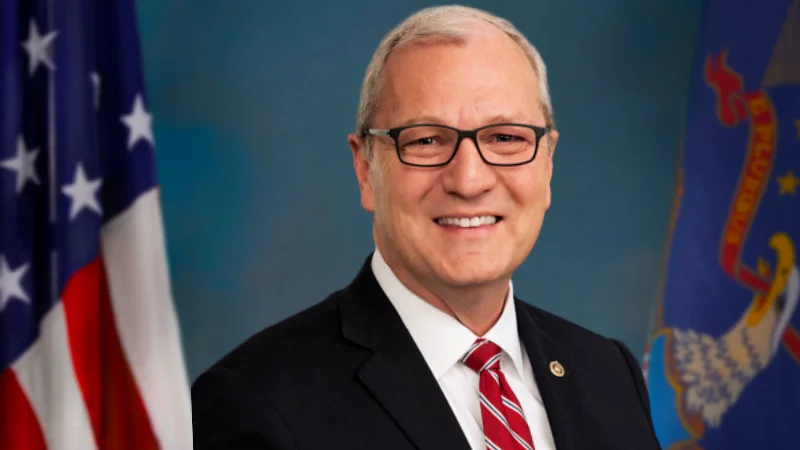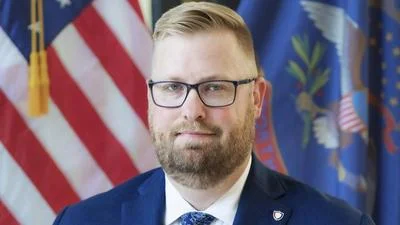Senator Kevin Cramer, US Senator for North Dakota | Senator Kevin Cramer Official website
Senator Kevin Cramer, US Senator for North Dakota | Senator Kevin Cramer Official website
U.S. Senator Kevin Cramer (R-ND), chair of the Senate Environment and Public Works (EPW) Subcommittee on Transportation and Infrastructure, led a hearing in Washington, D.C., focused on the development of the Surface Transportation Reauthorization Bill. The session centered on three bipartisan bills that Cramer has introduced with colleagues from the EPW committee.
The first bill discussed was S.1733, known as the Highway Funding Transferability Improvement Act. This legislation would allow state Departments of Transportation (DOTs) to transfer up to 75% of funds between formula categories, an increase from the current 50%. According to supporters, this change is intended to give states more flexibility in directing resources toward high-priority infrastructure projects that better reflect local needs.
The second measure highlighted was S.1167, or the Transportation Asset Management Simplification Act. This bill aims to reduce administrative requirements for state DOTs by eliminating annual asset management compliance reports. Proponents argue that this would enable agencies to focus more time and resources on maintaining and improving roads and bridges rather than completing repetitive paperwork.
The third proposal, S.1828—the Safe Routes Improvement Act—would require each state DOT to designate a Safe Routes to School Program coordinator. The goal is to improve program accessibility for communities across North Dakota and other states.
In his opening statement, Cramer said: “As we look toward reauthorization, I’m focused on advancing practical, bipartisan policies to improve the efficiency and effectiveness of the Federal Aid-highway program."
He continued: “As I like to say, without well-maintained routes like Interstate 94, which is made possible because of formula funding, durum wheat from North Dakota would never become pasta in New York or Los Angeles. North Dakota is low population state, but the number one producer of many commodities. Our roads can’t be relegated to gravel and expect interstate commerce to thrive. The formula system works and this committee has demonstrated a strong commitment to it over the years."
Cramer also emphasized his partnership with Ranking Member Alsobrooks on highway funding flexibility: “Greater flexibility for states is precisely the goal of the Highway Funding Transferability Improvement Act, which I was happy to partner with Ranking Member Alsobrooks on. It’s a great idea and I’m glad we’re working on it. Her forward-thinking approach on this issue is refreshing. The concept with our legislation is remarkably simple, a lot of good things are, but very important. States know their needs better than any bureaucrat in Washington."
“I look forward to working with my colleagues to get this bill done and to ensure the highway program is more responsive to the needs of our constituents,” he added.
During the hearing, Cramer introduced Chad Orn—Deputy Director for Planning at North Dakota Department of Transportation—and Marisa Jones—Managing Director for Safe Routes Partnership—as witnesses providing perspectives from both state government and advocacy organizations.
Jones described how several small towns in North Dakota have used Safe Routes funding: “Let’s look at North Dakota to see examples of how Safe Routes to School works in small towns and rural states. Gwinner, with population 924, built sidewalks to connect the Southside neighborhood to the school. Even Medora with just 155 residents completed a Safe Routes to School project connecting the high school to Main Street. And Minot...has been working on Safe Routes for 15 years...building sidewalks...funded through transportation alternatives program.”
Cramer questioned witnesses about ways federal policy could help accelerate delivery of infrastructure projects—a topic related closely with provisions included under One Federal Decision in recent federal infrastructure law.
Chad Orn responded: “We need to raise the rates on that for value engineering, and then the definition of a major project...Even here in North Dakota...just sheer cost of projects we’re right there.” He added that adjusting expectations around project costs could help address permitting challenges faced by states.
Samantha Biddle—the Maryland Deputy Secretary of Transportation—explained her state's approach: “We implemented legislation...that introduced a tiered fine structure and also allows us expand our implementation work zone cameras....it's not about generating revenue....It's about protecting our workers saving lives.”
Orn noted efforts within North Dakota as well: “We have a real good relationship with our AGC...we do work with them...[a] work zone is important but we don't want see bunch restrictions them....we still want flexibility....we make corrections....A few examples stuff did North Dakota as Samantha led we also just raised fines within work zones almost doubled them state that's going go effect August 1....we provide overtime dollars highway patrol so they can patrol work zone.”
Marisa Jones spoke about challenges facing rural communities accessing safety improvement funds: “There's more funding available but it means that in small rural community where they might not have full time staff at all maybe mayor also grocery clerk…they don't have capacity or awareness sometimes pursue [this] funding….this exactly why need statewide routes school coordinators…help communities…navigate federal funding apply grants build projects save lives…These are projects children families love local elected officials love these projects…help build economic development improve safety get kids physically active…and help get kids school time ready learn.”
Cramer closed by reiterating support for early bipartisan collaboration within EPW Committee as reauthorization moves forward next year:
“This is a good hearing and a good day discuss road ahead us….I commend Chairman Capito her leadership getting reauthorization process started early look forward working her Ranking Member Whitehouse Ranking Member Alsobrooks course my fellow committee members get comprehensive bipartisan bill across finish line next year….
“As we look toward reauthorization…I’m focused advancing practical bipartisan policies improve efficiency effectiveness Federal Aid-highway program….Some programs like Bridge Formula program high priority all states Governor Armstrong spoke strong support no surprise Department Transportation echoing same strong support your testimony today….
“But there areas where can improve….In recent months I’ve introduced three bills which believe all central effort Each reflects direct input from states about getting better outcomes without increasing cost taxpayers….
“From start however need emphasize importance preserving strengthening formula funding As I like say without well-maintained routes like Interstate 94 which made possible because formula funding durum wheat from North Dakota would never become pasta New York Los Angeles wouldn’t that be too bad…”






 Alerts Sign-up
Alerts Sign-up